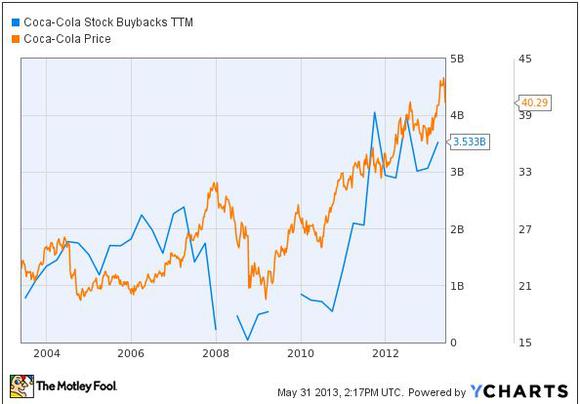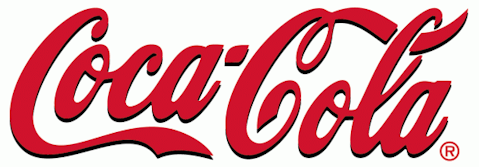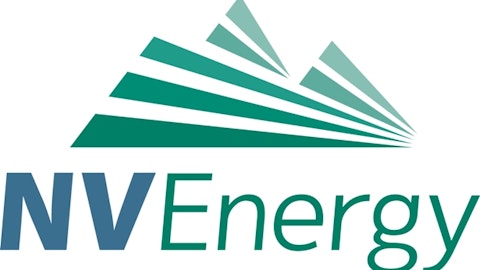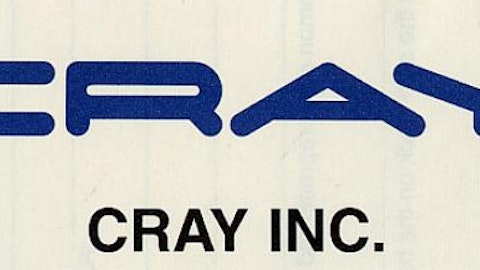Stock buybacks have been booming lately, and this has generated some criticism from analysts and the specialized media. Although buybacks have their pros and cons, we ultimately need to analyze the specific fundamentals and circumstances of each company and its buyback program to tell if a repurchase agreement is creating or destroying shareholder value.
A smart buyback
Warren Buffett understands a thing or two about capital allocation, and he has designed for Berkshire Hathaway Inc. (NYSE:BRK.B) what may be the most efficient and transparent repurchase program amongst publicly-traded companies. Buffett has set two main parameters to evaluate the convenience of a buyback program; from Berkshire Hathaway Inc. (NYSE:BRK.B)‘s shareholder letter for 2011:
Charlie and I favor repurchases when two conditions are met: first, a company has ample funds to take care of the operational and liquidity needs of its business; second, its stock is selling at a material discount to the company’s intrinsic business value, conservatively calculated.
Berkshire Hathaway Inc. (NYSE:BRK.B) will repurchase stock under two conditions: the company must have more than $20 billion in cash at hand for different uses, and the stock must also be trading at an attractive valuation, which Buffett has defined as a price to book value ratio below 1.2.
This provides clear and objective measures regarding the convenience of the program, and investors in Berkshire can feel comforted by the fact that the company won’t repurchase stock unless it’s in their best interest.
Strong companies, wrong timing
Many blue chips have a long standing policy of recurrent capital distributions via dividend increases and stock buybacks. The first condition is usually met in these cases, corporations like The Coca-Cola Company (NYSE:KO) have unquestionable financial strength, and they generate more than enough cash flow to reinvest in the business and return money to investors in the long term.
On the other hand, the timing of the buyback is usually suboptimal, to say the least. These companies typically spend more on repurchases when they are having a good year and the business is generating lots of cash. Unfortunately, this is usually the kind of situation in which the stock price is generally rising, so these companies end up repurchasing more stock when it´s more expensive, exactly the opposite of what they should be doing.
In the following chart we can see the historical evolution of the stock price and buybacks for The Coca-Cola Company (NYSE:KO) over the last 10 years, and the evidence is quite telling. Instead of capitalizing the opportunity to accelerate buybacks during the 2008-2009 recession, the company materially reduced repurchases over that period.

When it comes to a corporation like The Coca-Cola Company (NYSE:KO), no recession or financial crisis is going to derail the company: it owns the most valuable brand in the world according to Interbrand and an unmatched global distribution network to keep competitors at bay in a defensive industry. The Coca-Cola Company (NYSE:KO) is a steady and reliable cash machine, so the company should try to seize the opportunity to repurchase stock at attractive prices during recessions instead of hoarding more cash in such scenarios.
The Coca-Cola Company (NYSE:KO) is a mature business, and it´s having trouble increasing sales in developed countries due to market saturation and lackluster growth in carbonated drinks as consumers move towards healthier alternatives. Even in emerging countries, where demand is still expanding strongly, the company generates cash flows well above its reinvestment needs.
The Coca-Cola Company (NYSE:KO) produces more cash than it needs, and it´s not a high growth businesses anymore, so capital allocation policy is will be a big determinant of investor´s returns over the next years. Regularly increasing dividends and buying back shares is a solid and reliable strategy, but investors would be better served if management decided to imitate Berkshire – a major investor in Coke – and utilize its resources more efficiently by increasing buybacks when valuations become more attractive.
Destructive buybacks
Buybacks can become clearly destructive when they are done by the wrong companies and for the wrong reasons, and Hewlett-Packard Company (NYSE:HPQ) is a textbook example about that. As management was becoming concerned over stagnating growth due to the mobile boom which was hurting PC sales, the company turned to share repurchases to artificially increase earnings per share, especially in 2010 and 2011.

This didn´t work out at all, margins continued decreasing due to falling prices and lackluster sales in the commoditized PC industry, so the big buybacks the company implemented in years like 2010 and 2011 are now looking like an expensive mistake.
When the business is being challenged by changing industry conditions, distributing cash to shareholders is hardly the safe thing to do. Besides, if fundamentals are deteriorating, it becomes much harder to tell if the company is in fact undervalued or if it’s the typical value trap situation in which a cheap stock continues getting cheaper over time because the company can´t manage to overcome its problems.
Hewlett-Packard Company (NYSE:HPQ) is trying to reinvent itself by reducing costs, restructuring operations and increasing its presence in businesses with higher profitability like software and services. But CEO Meg Whitman has been quite explicit on the fact that the company has a long and rocky road ahead, her turnaround plan will take until 2016, and many different things need to go well for it to succeed.
The company is facing an enormous amount of uncertainty regarding its long term relevance or even its viability, and it has substantially increased its financial leverage due to ineffective acquisitions and share buybacks over the last years. Hewlett-Packard Company (NYSE:HPQ) should be spending huge amounts of money in research and development – or assertive acquisitions – in order to develop the technologies to move beyond the lackluster PC industry, but instead it needs to monitor its financial resources closely and try to reduce leverage as much as possible so it can stay out of financial trouble.
Bottom line
Repurchases are neither a good or bad thing for investors on a standalone basis. Depending on aspects like the company´s fundamentals, its financial resources and the valuation of the stock, they can be an efficient way to distribute capital to investors while increasing shareholder value or a destructive and dangerous policy focused on short term goals. Like is usually the case with these sorts of things, looking into each case in full detail is the best approach to evaluating buybacks.
The article How to Tell if Buybacks are Creating or Destroying Shareholder Value originally appeared on Fool.com and is written by Andrés Cardenal.
Andrés Cardenal owns shares of Berkshire Hathaway. The Motley Fool recommends Berkshire Hathaway and Coca-Cola. The Motley Fool owns shares of Berkshire Hathaway. Andrés is a member of The Motley Fool Blog Network — entries represent the personal opinion of the blogger and are not formally edited.
Copyright © 1995 – 2013 The Motley Fool, LLC. All rights reserved. The Motley Fool has a disclosure policy.






